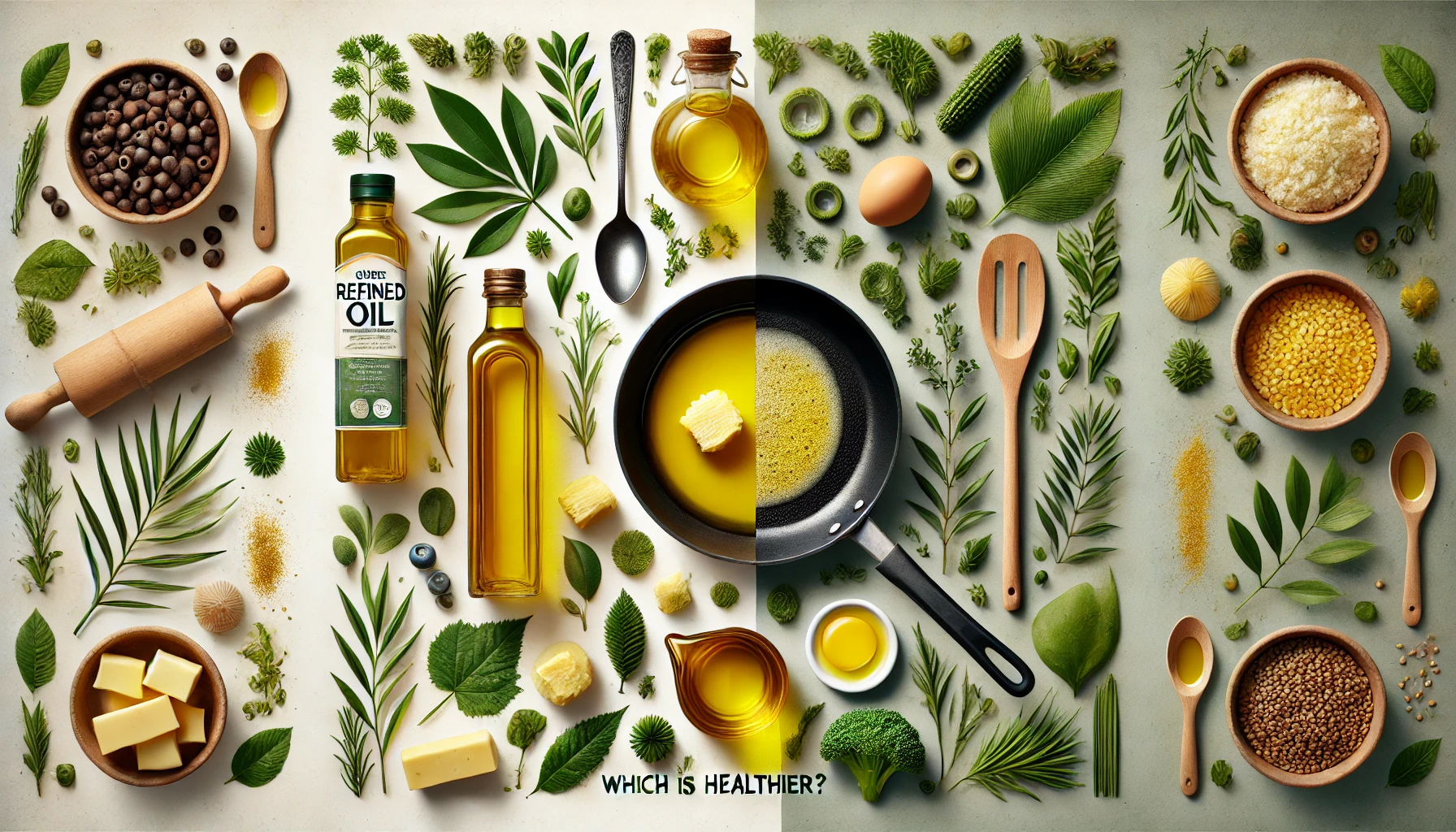- You have no items in your shopping cart
- Subtotal: ₹0.00

Ghee vs. Refined Oils: Which Is Healthier?
In today’s health-conscious world, the debate between ghee and refined oils is a prominent one, with both sides offering various arguments about their health benefits and drawbacks. While ghee, a traditional Indian cooking fat, has been used for centuries, refined oils are more recent introductions, often marketed as a “healthier” option. But is this truly the case? Let’s dive deep into the comparison, examining both ghee and refined oils from a nutritional and health perspective, backed by scientific research.
What Is Ghee?
Ghee, also known as clarified butter, is a type of fat traditionally used in Indian cooking and Ayurveda. It is made by simmering butter to remove water content, milk solids, and impurities, leaving behind pure fat. This process results in a rich, flavorful product that is prized for its health benefits and its ability to withstand high temperatures without breaking down.
What Are Refined Oils?
Refined oils are vegetable oils that undergo significant processing, including refining, bleaching, and deodorizing. These oils are often treated with heat and chemicals to remove impurities, which can strip them of their natural nutrients. Common examples include sunflower oil, soybean oil, canola oil, and corn oil.
Nutritional Composition
The first step in understanding which is healthier is to compare the nutritional profiles of ghee and refined oils.
- Ghee:
- Fat content: Ghee is made up primarily of saturated fats, but also contains medium-chain triglycerides (MCTs), which are easily digested and can be used for quick energy.
- Vitamins and antioxidants: Ghee is rich in fat-soluble vitamins like A, D, E, and K. It also contains butyrate, a short-chain fatty acid that plays a crucial role in gut health and reducing inflammation.
- High smoke point: Ghee has a high smoke point (about 250°C/482°F), making it stable for high-heat cooking without breaking down into harmful free radicals.
- Refined Oils:
- Fat content: Refined oils are high in polyunsaturated fats, particularly omega-6 fatty acids, which can lead to inflammation when consumed in excess. These oils also contain some monounsaturated fats, which are beneficial for heart health.
- Nutrient loss: The refining process can strip oils of their natural nutrients, including antioxidants and fat-soluble vitamins. This results in a product that is less nutrient-dense than ghee.
- Low smoke point: Many refined oils, such as canola and sunflower oil, have lower smoke points (around 200°C/392°F). This means they break down into harmful substances when exposed to high heat.
Health Benefits of Ghee
- Rich in Butyrate: Ghee contains butyric acid, a short-chain fatty acid that has been shown to have numerous health benefits. Butyrate is essential for maintaining gut health, as it helps nourish the cells lining the colon and has anti-inflammatory properties. Studies have shown that butyrate can help reduce the risk of colon cancer and inflammatory bowel disease (IBD) .
- Improves Digestion: According to Ayurvedic principles, ghee is considered one of the best fats for digestion. It stimulates the secretion of stomach acids, aiding in the breakdown of food. The medium-chain triglycerides (MCTs) in ghee are easy to digest and provide a quick source of energy.
- High in Antioxidants: Ghee is rich in fat-soluble vitamins like A and E, which act as powerful antioxidants. Antioxidants help fight free radicals in the body, reducing oxidative stress and inflammation. This, in turn, can lower the risk of chronic diseases like heart disease, diabetes, and cancer .
- Supports Heart Health: Contrary to popular belief, ghee may actually benefit heart health when consumed in moderation. Studies have shown that the consumption of clarified butter like ghee does not raise levels of low-density lipoprotein (LDL) or “bad cholesterol” in a significant way, especially compared to trans fats found in some refined oils .
- Lactose-Free and Suitable for the Lactose Intolerant: The process of making ghee removes milk solids, which includes lactose and casein. This makes ghee suitable for those who are lactose intolerant or sensitive to dairy products.
Health Risks of Refined Oils
- High in Omega-6 Fatty Acids: While omega-6 fatty acids are essential for the body, consuming them in large amounts—especially in relation to omega-3 fatty acids—can promote inflammation. The modern diet is heavily skewed toward omega-6 consumption due to the prevalence of refined oils like soybean and sunflower oil. Chronic inflammation is linked to various health issues, including heart disease, obesity, and arthritis .
- Potential Formation of Trans Fats: The refining process often involves high heat, which can lead to the formation of trans fats—the most harmful type of fat. Trans fats raise LDL cholesterol while lowering HDL (good cholesterol), significantly increasing the risk of heart disease and stroke. Even small amounts of trans fats can be detrimental to health, as shown in various studies .
- Toxin Formation at High Temperatures: When refined oils are heated above their smoke points, they break down into harmful compounds, including free radicals and aldehydes. These toxic substances can damage cells, contribute to aging, and increase the risk of cancer .
- Nutrient Stripping During Processing: The refining process strips oils of their natural nutrients, including antioxidants and fat-soluble vitamins. Unlike ghee, which retains its nutrients even at high temperatures, refined oils are often nutrient-devoid after processing. This makes them a less healthy option for regular consumption.
Scientific Studies Comparing Ghee and Refined Oils
- Study on Ghee and Heart Health (2010): A study published in the Journal of Nutrition found that consuming moderate amounts of ghee did not significantly raise LDL cholesterol levels in healthy individuals. In fact, ghee contains conjugated linoleic acid (CLA), which has been shown to reduce fat mass and improve lipid profiles .
- Refined Oils and Inflammation (2017): A study published in the American Journal of Clinical Nutrition linked the excessive consumption of omega-6 fatty acids from refined oils with increased markers of inflammation in the body. The study also noted that an imbalance of omega-6 to omega-3 could contribute to various chronic inflammatory diseases .
- Ghee vs. Refined Oils and Oxidative Stress (2018): A research article in the Journal of Food Science demonstrated that ghee contains high levels of antioxidants compared to refined oils, which lose much of their antioxidant content during processing. The study emphasized the importance of preserving natural fats like ghee for their protective properties against oxidative stress .
Ghee and Refined Oils in Cooking
When it comes to cooking, both ghee and refined oils have different properties that affect their use in the kitchen.
- Ghee: Ghee is ideal for frying, sautéing, and roasting because of its high smoke point. It is stable at high temperatures and does not break down into harmful compounds. Its rich flavor also enhances the taste of food, making it a favorite in Indian cooking.
- Refined Oils: Refined oils, especially those with low smoke points, are not ideal for frying or high-heat cooking. They tend to oxidize quickly when heated, leading to the formation of harmful substances. While oils like canola and sunflower oil are commonly used for frying, they are not as stable as ghee.
Ghee vs. Refined Oils: Which Is Healthier?
Based on the evidence presented, ghee emerges as the healthier option for several reasons:
- Nutrient Density: Ghee is packed with essential nutrients like vitamins A, D, E, and K, and contains beneficial fatty acids like butyrate and CLA. Refined oils, on the other hand, lose most of their natural nutrients during processing.
- Cooking Stability: Ghee has a higher smoke point and does not break down into harmful compounds when heated. Many refined oils, especially those high in polyunsaturated fats, can produce toxic substances when exposed to high temperatures.
- Inflammatory Response: Ghee has anti-inflammatory properties due to its butyrate content, while refined oils—particularly those high in omega-6 fatty acids—can contribute to inflammation when consumed in excess.
- Health Risks: Ghee, when consumed in moderation, is not associated with negative health outcomes. In contrast, excessive consumption of refined oils, especially those containing trans fats or omega-6 fatty acids, has been linked to various chronic diseases.
Conclusion: Choose Ghee for Healthier Cooking
In the battle of ghee vs. refined oils, ghee clearly stands out as the healthier choice. Whether you’re looking to improve heart health, reduce inflammation, or simply add more nutrients to your diet, ghee offers numerous benefits that refined oils cannot match.
At GheeStore, we pride ourselves on offering 100% pure, grass-fed ghee that retains all its natural goodness through traditional methods of preparation. Pair our ghee with our range of cold-pressed oils to enhance your cooking experience while reaping the health benefits. Whether you’re frying, sautéing, or adding ghee to your favorite dish, you’ll taste the difference in quality and nutrition.
Switch to GheeStore’s Ghee and Cold-Pressed Oils Today! You’ll experience better health, flavor, and cooking versatility. Visit GheeStore to learn more about our premium products.



